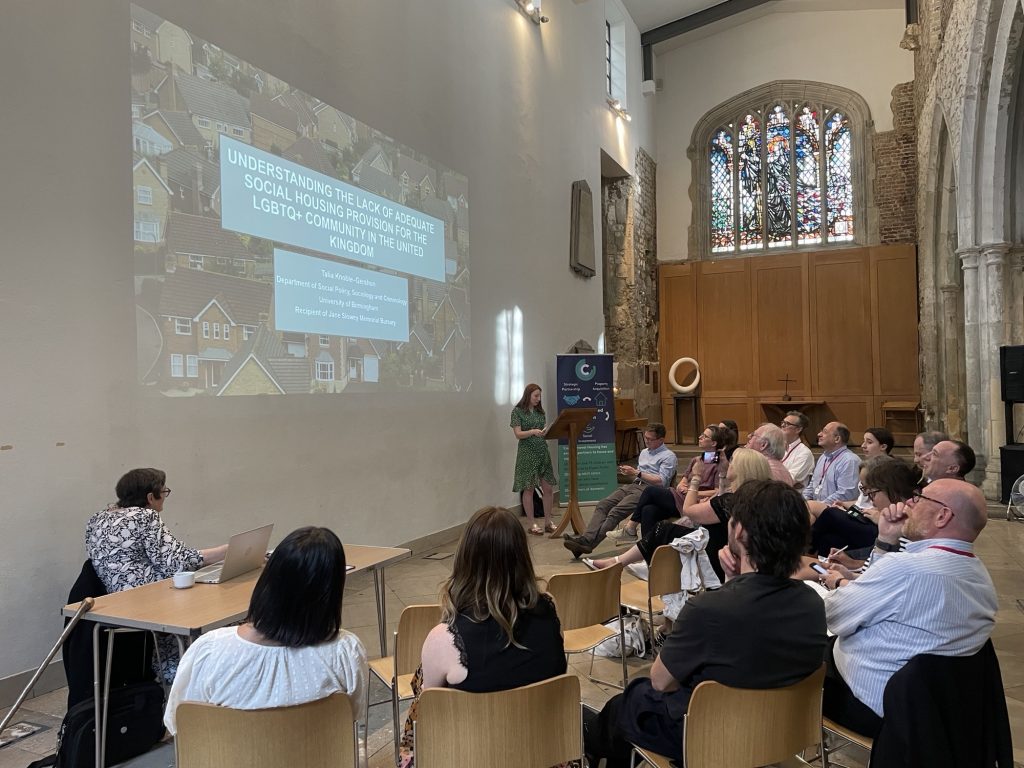
Understanding the lack of adequate social housing provision for the LGBTQ+ community in the United Kingdom
It was an honour to be one of four from the University of Birmingham to be awarded the Jane Slowey Memorial Bursary, established in honour of an amazing woman who advocated against social injustices in society.
The grant money allowed me to concentrate fully on my dissertation and other pieces of work and conduct many insightful interviews with experts. It also minimised the stresses associated with the cost-of-living crisis in my final year of studies, something I am very grateful for.
Additionally, being awarded this prestigious award gave me inspiration to write my dissertation, as I knew my results and input would be used to inspire change in the future.
My dissertation topic focused on understanding the lack of adequate social housing provision for the LGBTQ+ community in the United Kingdom. Interestingly there was a massive lack of literature into this topic, which made the dissertation process simultaneously challenging and exciting.
My research focused specifically on the ageing LGBTQ+ population and the homeless youth population. These were two key groups which the limited research in the field showed felt invisible and misunderstood. Overall, I found a lack of effective social housing solutions for both groups.
In total, I undertook eleven interviews with experts in this field, which produced valuable research findings.
My research findings included:
The need for a cohesive relationship between government and third sector:
The interviews highlighted this was important to ensure that effective, realistic policies are implemented into law and that third sector organisations expertise is utilised to ensure effective strategies.
Front line Staff :
There was consensus amongst those I interviewed that frontline staff in care homes and other facilities did not understand the specific needs of the LGBTQ+ community members they were working with. Many fear they would face transphobia and homophobia from the staff.
Potential new strategies for front line staff :
Person centred approach which is a way to adjust service provision to each LGBTQ+ service user depending on their individual needs.
Cultural competency training, which is training that involves educating front line staff about the experiences , culture, history of the LGBTQ+ population, is also necessary to create an understanding of their experiences. Mandatory training across all care homes will also help to ensure the ageing LGBTQ+ population feel safe and protected.
The current issues with the local connection rule:
The local connection rule is used by many councils to prioritise and allocate housing for people who have a connection to the area. For example, being employed in the area or having family who live there.
However, my research found many LGBTQ+ people don’t want to live in their local area and want to live in a more progressive area. As such, the local connection rule should change to the community connection rule that considers LGBTQ+ people want to live in communities they feel supported and safe in over the locality.
LGBTQ+ affirming social housing:
There was agreement in the interviews that there needed to be more social housing choice for the LGBTQ+ community.
Affirmative social housing allows residents to have their identities celebrated and their histories and contributions recognitions. This would help the LGBTQ+ population as it would give them a safe space to express themselves and their identity, allowing them to live a fuller life.
The experts that I interviewed felt this housing should be LGBTQ+ majority not exclusive to create links to the outside world so that people can learn from each other.
Political ideology and its impact:
The interviews exemplified how heteronormative political ideology has meant that the UK government has not sufficiently understood the LGBTQ+ communities housing needs.
This has led to a lack of evidence-based reports and primary care data which would help create a better understanding of housing needs.
In order for the housing needs of the LGBTQ+ community to be met, they must be directly included in the creation of adequate social housing strategies and policy. An example of how this could be done is through tenant panels and tenant representation.
Conducting my dissertation allowed an understanding that policy needs to be created in line with queer theory and intersectionality to meet the social housing needs of many members of the LGBTQ+ community
Going forward I believe some key recommendations are:
- For there to be much more research into the social housing needs of the LGBTQ+ community through national yearly housing needs assessments for LGBTQ+ people
- Cultural competency training and person on person training must be compulsory in all extra care living schemes and mainstream social housing
- More research if the localism act 2011 which devolved authority of social housing to the local authorities is suited to meet the housing needs of the LGBTQ+ community.
I will begin the national development programme for Haringey Council in September 2023 which is a two-year programme with four six-month programmes within council services. In the future I hope to write social housing policy and continuously work on improving social housing services in the United Kingdom.
Get in touch with Talia at: taliakg9@gmail.com
